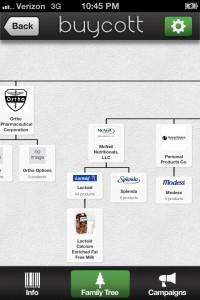Promoting Consumer Activism
A new app has been released that lets consumers know the companies behind their supermarket choices. As reported in Forbes, the free app, called Buycott, lets consumers scan the bar code on an item to find out about the brand and its position in the corporate family tree. The app also includes the ability to create user-generated campaigns to boycott or support particular business practices, such as companies donating money to oppose labeling of GMO foods or companies that support marriage equality.
The app was the brainchild of Ivan Pardo, a freelance programmer from Los Angeles. Pardo was inspired by a speech given by Darcy Burner, a Democrat who lost the 2012 election for Washington State’s first congressional district. In a speech to Democratic activists at Netroots Nation, Burner described the problems associated with secret donations to conservative causes by powerful corporate actors. As Burner described it at the time, “Our democracy has been bought and sold by people like the Kochs. When I’m out talking to voters, they say they want a way to take action.” But as Burner noted, complex corporate hierarchies can make taking action difficult.
Now, consumers can scan the barcode of a product and find out, for example, that purchasing Brawny paper towels, Angel Soft toilet paper or Dixie cups, supports Georgia-Pacific, a subsidiary of Koch Industries.
It’s an interesting development in the arena of consumer activism, around which I’ve previously expressed a degree of skepticism. However, I think this is a positive development. More information will certainly help on the margins, and some people will certainly rethink their shopping habits based on this. But I still maintain that consumer activism (or more broadly, consumer citizenship) represents a very hollow understanding of both activism and citizenship in the modern world.

In which way do you feel that consumer citizenship is lacking? I mean, I agree that passive consumerism – even if deliberately supporting companies you support and boycotting those you don’t – isn’t the end-and-be-all of actively participating in setting societal values, but on a low-effort level I do feel that consumers have considerable, until now unharnessed power to shape what our food system could look like in the future. Personally, I find that the current unquestioning the-cheaper-the-better attitude is what keeps our system in place and makes it so hard for more sustainable initiatives to scale up.
Thanks for your comment. You raise a good question.
It’s not that I think that consumer activism per se is a bad idea. My concern is that we look to consumer citizenship as a vehicle to supplant traditional forms of citizenship and activism. To the extent that boycotts or more educated forms of consumer behavior replace more passive forms of (as you describe it, “the cheaper-is-better attitude”) consumerism, I think it’s a positive.
However, I think that for many, consumer citizenship is not a complement to traditional forms of political participation, but their replacement. I’m similarly concerned by “clicktivism” or “slacktavism,” the idea that we can change the world by signing an online petition or clicking a link. Real change takes hard work, and my concern is that we engage in more limited forms of participation not because they are more effective but because they are easier.
An additional challenge in the conflation of consumer activism and citizenship is the problem that it privileges certain actors over others. If consumer behavior is the primary source of political agency, then those who can afford to do the most consuming have the greatest number of votes.
I’m not suggesting that this is the end of effect of consumer activism. Indeed, I think that consumer activism has a valuable contribution to make in the struggle for a more equitable, just, and humane food system. But I don’t think consumer activism will get us there by itself.
Thanks for those thoughts! Thinking about it this way, I do agree with your point of view, especially with regard to the question of equity and privilege. I took up parts of your comment in a recent blog post of mine thinking further about the topic, I hope you don’t mind! (Or let me know and I’ll obviously take it down). You can find it here: http://foodpolicyforthought.wordpress.com/2013/05/18/buycott-the-app-so-popular-it-crashes-site/